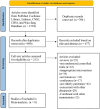Efficacy of acupuncture for functional constipation in elderly: a systematic review and meta-analysis
- PMID: 39697209
- PMCID: PMC11652177
- DOI: 10.3389/fmed.2024.1473847
Efficacy of acupuncture for functional constipation in elderly: a systematic review and meta-analysis
Abstract
Background: Numerous clinical studies have shown that patients suffering from functional constipation can benefit by combining medication with acupuncture. There have been no published reviews or meta-analyses regarding the use of acupuncture in treating functional constipation in older adults. Therefore, we carried out a meta-analysis to assess the impact of acupuncture on elderly patients dealing with functional constipation.
Methods: This study retrieved randomized controlled trials (RCTs) on acupuncture therapy for functional constipation in the elderly from several electronic databases, including Embase, PubMed, Cochrane Library, Wanfang Database, Chinese BioMedical Literature Database, and China National Knowledge Infrastructure. In these databases, clinical investigators evaluated the effectiveness of acupuncture as a primary treatment for elderly people with functional constipation. The Cochrane Handbook for Systematic Reviews of Interventions was used by researchers to evaluate the quality of the study.
Results: A total of 469 elderly individuals were included in 8 RCTs. The meta-analysis yielded compelling findings: the application of acupuncture has significantly elevated the rates of treatment effectiveness compared to the control group. Compared with the control group, the treatment group exhibited a statistically significant difference in complete spontaneous bowel movements after treatment. The two groups showed no significant difference in spontaneous bowel movements. However, there was a significant difference in the Bristol Stool Scale scores. The Defecation Difficulty Score and Patient Assessment of Constipation Quality of Life (PAC-QOL) showed p-values that indicated no significant effect. However, acupuncture improved bowel movements, demonstrating a significant difference in the Clinic Constipation Score (CCS) when comparing the two groups. The Nitric Oxide Synthase (NOS) and 5-Hydroxytryptamine (5-HT) contents changed significantly after intervention in both groups. An article reported that the improvement of traditional Chinese medicine (TCM) symptom scores was better in the treatment group than in the control group.
Conclusion: The analysis results indicated that acupuncture can be beneficial for elderly people with functional constipation; however, strong and comprehensive data are not yet obtainable. Given that our study is based on evidence that is of a low-to-moderate quality, further high-quality research is necessary to enhance the feasibility and practicability of this treatment.
Systematic review registration: https://www.crd.york.ac.uk/PROSPERO/, identifier CRD42024533215.
Keywords: acupuncture; elderly people; functional constipation; meta-analysis; systematic review.
Copyright © 2024 Song, Hao and Fu.
Conflict of interest statement
The authors declare that the research was conducted in the absence of any commercial or financial relationships that could be construed as a potential conflict of interest.
Figures









References
-
- Li YQ, Yu YB. Diagnosis and treatment of functional constipation. Chin J Pract Int Med. (2011) 31:158–60. (in Chinese)
-
- Guidelines for the diagnosis and treatment of chronic constipation in China (2013, Wuhan). Gastroenterology. (2013) 18:605–12. (in Chinese)
Publication types
LinkOut - more resources
Full Text Sources

